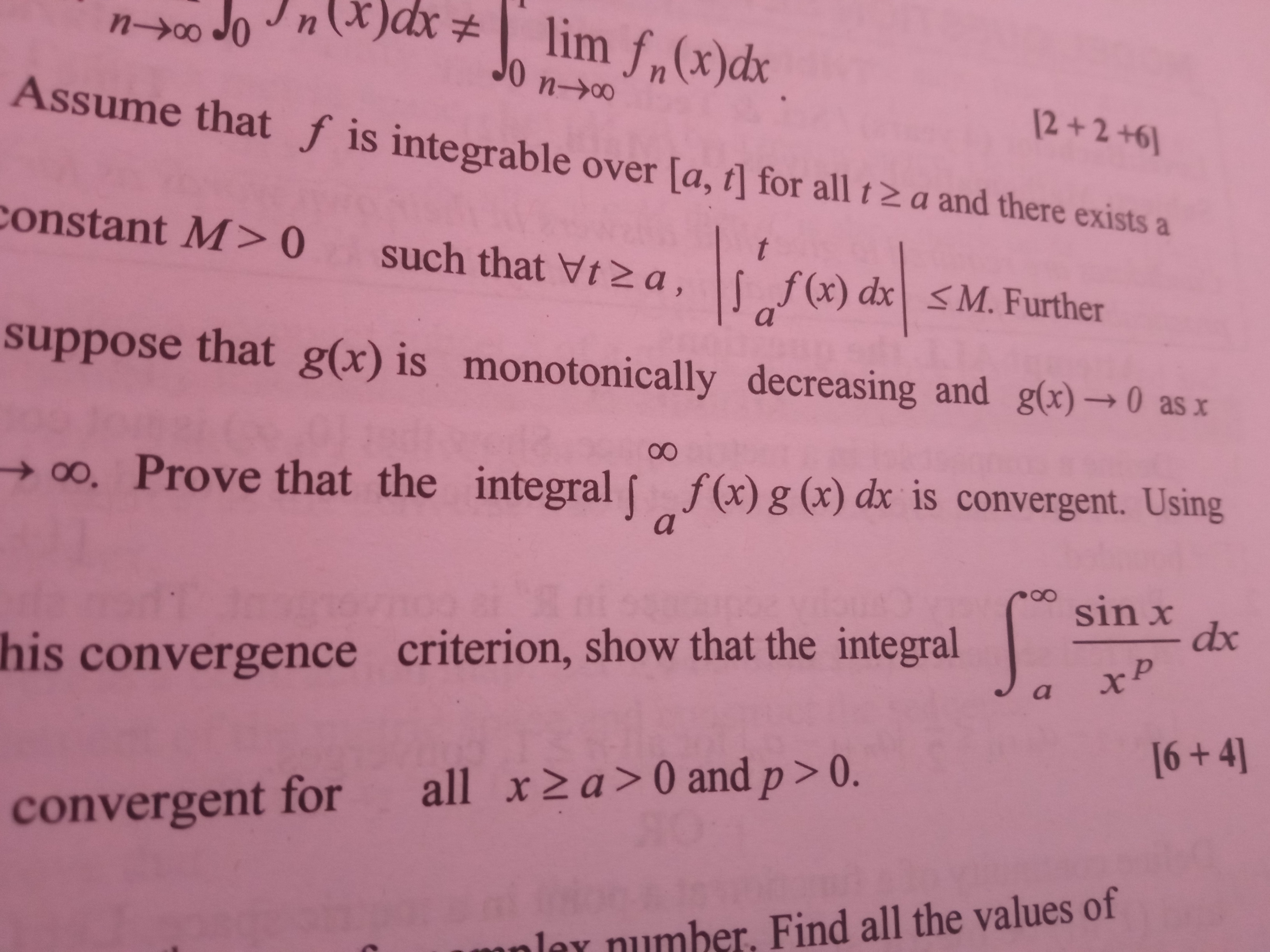Assume that f is integrable over [a, t] for all t ≥ a and there exists a constant M > 0 such that for all t ≥ a, |∫_a^t f(x) dx| ≤ M. Further suppose that g(x) is monotonic decreas... Assume that f is integrable over [a, t] for all t ≥ a and there exists a constant M > 0 such that for all t ≥ a, |∫_a^t f(x) dx| ≤ M. Further suppose that g(x) is monotonic decreasing and g(x) → 0 as x → ∞. Prove that the integral ∫_a^∞ f(x) g(x) dx is convergent. Using this convergence criterion, show that the integral ∫_a^∞ sin(x) / x^p dx is convergent for all x ≥ a > 0 and p > 0.

Understand the Problem
The question is asking to prove the convergence of a specific integral involving two functions, f(x) and g(x), under given conditions. It also requests to use a convergence criterion to show the convergence of another integral involving sin(x).
Answer
The integral $\int_a^\infty \frac{\sin x}{x^p} \, dx$ converges for $p > 1$.
Answer for screen readers
The integral $\int_a^\infty f(x) g(x) , dx$ is convergent, and $\int_a^\infty \frac{\sin x}{x^p} , dx$ is convergent for $p > 1$.
Steps to Solve
- Prove the convergence of the integral $\int_a^\infty f(x) g(x) , dx$
We apply the properties of integrals with absolute convergence. Given that $$ | \int_a^t f(x) , dx | \leq M $$ for all $t \geq a$, which suggests that $f(x)$ is bounded in terms of its integral, we reinterpret the integral:
Consider the integral $I(t) = \int_a^t f(x) g(x) , dx$. By properties of absolutely convergent integrals and the Lebesgue Dominated Convergence Theorem, we note that:
$$ |I(t)| = \left| \int_a^t f(x) g(x) , dx \right| \leq \int_a^t |f(x)| |g(x)| , dx $$
- Use properties of $g(x)$
Since $g(x)$ is monotonically decreasing and tends to $0$ as $x \to \infty$, we can find a constant $C > 0$ such that for sufficiently large $x$, $g(x) < C/x$ for some $C$.
Thus, replace $g(x)$ in the integral:
For large enough $x$, we have $$ |f(x) g(x)| \leq |f(x)| \frac{C}{x} $$
- Apply the convergence criterion
We can now evaluate:
$$ \int_a^\infty |f(x)| g(x) , dx \leq C \int_a^\infty \frac{|f(x)|}{x} , dx $$
Since the integral $\int_a^\infty \frac{|f(x)|}{x} , dx$ converges (as we assume $f(x)$ is integrable), the integral $\int_a^\infty f(x) g(x) , dx$ converges.
- Show the convergence of $\int_a^\infty \frac{\sin x}{x^p} , dx$ for $p > 0$
Using the result from the earlier proof, notice that:
Since $g(x) = \frac{1}{x^p}$ is decreasing and approaches $0$ as $x \to \infty$, we can use similar reasoning:
$$ |g(x)| = \left| \frac{\sin x}{x^p} \right| $$
Using boundedness of $|\sin x| \leq 1$, we integrate:
$$ \int_a^\infty \frac{1}{x^p} , dx $$
This integral converges for $p > 1$.
- Summarize the results
Thus, we conclude that both integrals converge under the given conditions.
The integral $\int_a^\infty f(x) g(x) , dx$ is convergent, and $\int_a^\infty \frac{\sin x}{x^p} , dx$ is convergent for $p > 1$.
More Information
The results illustrate convergence criteria for products of integrable functions and show how bounds on functions define convergence behaviors in improper integrals.
Tips
- Confusing conditions for convergence. Ensure $g(x)$ goes to $0$ rapidly enough for convergence.
- Not applying the dominant convergence theorem correctly. Always check the bounding function converges.
AI-generated content may contain errors. Please verify critical information